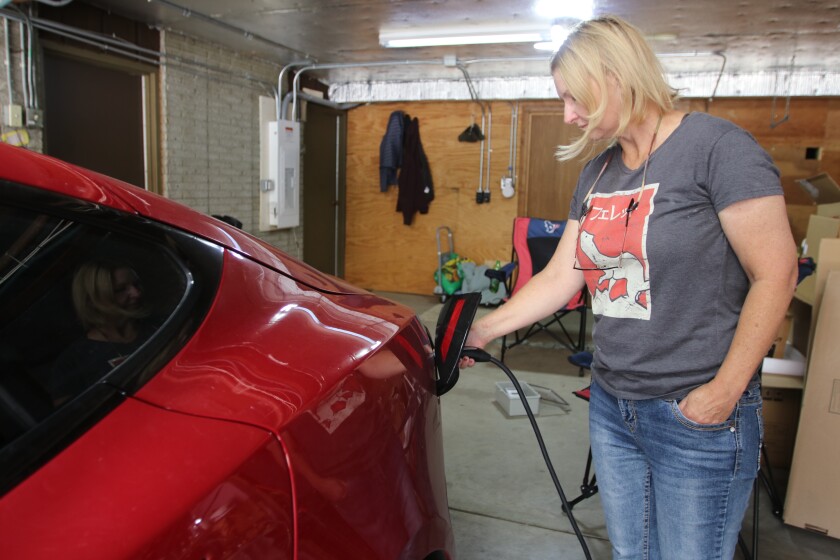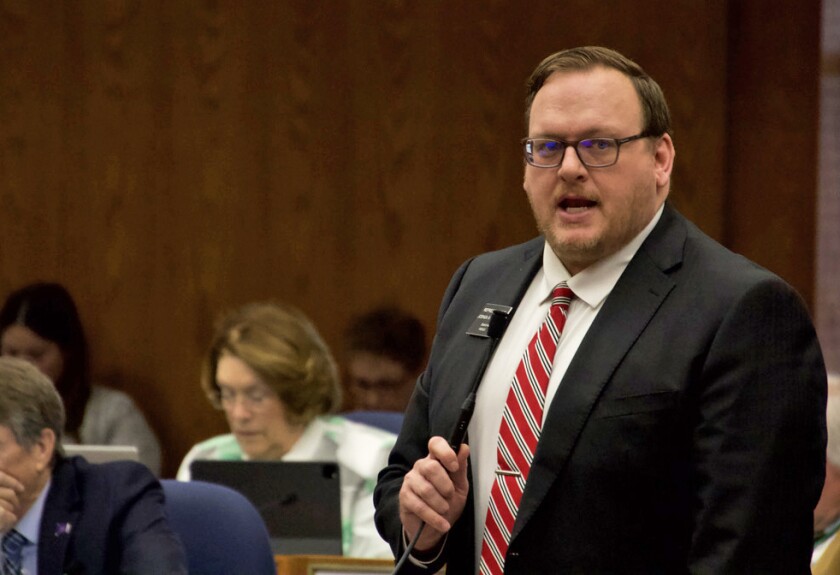FARGO — All Dana Woodruff wanted was a submeter to keep track of her voltage while charging “Lucy 1.0,” her Tesla Model 3. As a new owner of a condo at Elm Terrace Condominium Association, she didn’t realize the garage wasn’t running on a separate meter.
So, she had a submeter for a 240-volt Tesla Wall Connector installed. Cost: $900. She paid her monthly bill to charge her car every month. Cost: $36 to $70 monthly. She also installed a garage heater. Cost: $1,500.
What ensued shortly afterward she described as nothing less than a convoluted mess with name-calling, a civil case that almost went to a jury trial, and, ultimately, a new state law, one of the first of its kind regarding electric vehicles.
Former association board members said that although they weren’t familiar with electric vehicle charging, they were looking out for safety issues. Kim Feske, former board president, said Woodruff nearly cost the condo association and the state “a lot of money.”
“It’s about a car that cost the association nothing, and then turned into 'Game of Thrones, condo edition.' It became ugly and expensive,” said Woodruff, who moved to Fargo in 2021 for her job as an engineer. She speaks with a slightly Southern accent, having moved north from Texas.
ADVERTISEMENT
The problems began a few months after she moved in, following the fiercely cold winter of 2021. The association was sent a catch-up electricity bill of about $9,000 for the compound's 24 units, Woodruff said.
“Needless to say, that freaked everyone out,” she said. “They decided I was to blame.”
She was ordered to take down her charging station and her garage heater and pay a bill of $3,250.80, court documents stated. According to the association’s bylaws, electricity was provided to each unit on a separate meter, but she discovered shortly after moving in that the garage meter was shared.
Woodruff was told by an association board member that she was a “thief and a liar,” according to court documents.
“A lot of this does not make sense, and that’s why I struggled. I have an engineering mind, and I’m not good with people," she said. "I’m good at facts. I’m good at logic. I’m good at analysis, but I’m just not good with people.”
The math didn’t add up, especially since she didn’t install the heater until either late December 2021 or early January 2022 but was charged $758 for that month, $1,000 a month through February, and then another bill for $758, she said.
“And that is what made me angry,” Woodruff said.
Joy Nesemeier, current president of the association’s board, said she wasn’t aware of the situation at the time, but the process of billing Woodruff went against the association’s bylaws that stipulate all meetings were to be open to residents.
ADVERTISEMENT
“They didn’t really share information about what was going on with the association. They dealt with it themselves. I was hoping they would be more forthcoming with information,” Nesemeier said, adding the case may spark some changes at the complex.
“I just hope that things can become friendlier,” she said.
Feske said Woodruff never had permission to install the submeter, which he referred to as a high-speed supercharger. Woodruff told The Forum she received verbal permission.
“She’s a con and a fraudster. I got 24 units, and she’s forcing us to make a decision. She came close to costing our association a lot of money and the state a lot of money," Feske said. "We settled the suit; she didn’t win it."

C.S. Hagen / The Forum
‘It made zero sense’
Eventually, the association passed a new bylaw that stipulated electric car owners needed to install a separate metered circuit, which only a utility company can install. At the time, due to rising raw material costs, that would have run Woodruff between $15,000 to $20,000, she said.
But state law, which supersedes bylaws, stipulates new directives cannot be more restrictive than when a tenant first moved in.
“I refused to pay several thousand dollars. The next thing I know is that I got a letter from the association saying they would cut off the electricity to my garage and to contact the attorney,” Woodruff said.
ADVERTISEMENT
Asa Burck, the association’s attorney at the time, declined to comment on the case for this story.
Woodruff used a slower, 120-volt Tesla Mobile Connector to charge “Lucy 2.0,” her new Tesla Model 3. She also hired an attorney, James Teigland of Fremstad Law Firm.
All parties prepared for a jury trial, which wasn’t cheap. Teigland was contacted by The Forum for comment but did not reply.
“They spent $17,000 of community money (on the case) for a car that hadn’t cost them any money and a heater ... (they say) cost them $3,000. It made zero sense,” Woodruff said, adding her attorney fees were about the same.
The association’s board members tried to resolve the issue with Woodruff, Feske said.
“The board of directors here tried to tell her that she can’t hook up appliances to our common lines. She hooked it up with a meter, she knew she was doing the wrong thing, and we discovered she was running that charger,” Feske said.
At first, the association billed her about $70 a month, until January 2022 when she installed the garage heater, and then electric bills skyrocketed, Feske said.
“Financially, we billed her $3,000 and told her to disconnect them. She turned around and sued us to get out of paying the $3,000 electric bill. And that’s when things went to the races,” Feske said.
ADVERTISEMENT
Writing protections into law
Before the 68th Legislative Assembly began, Woodruff sat down with Rep. Josh Boschee, D-Fargo, and pitched him an idea for a new law that would help protect electric car owners.

Jeremy Turley / Forum News Service
Boschee later introduced House Bill 1310, a proposal that authorized an association homeowner, at their own expense, to install a car charger that is submetered and then pay the association for the submetered electricity.
The bill garnered bipartisan support, with additional support from the coal industry, and passed both chambers by a wide margin. The bill was signed into law by Gov. Doug Burgum on April 27.
In a letter directed to Boschee, other legislators and tenants, Feske expressed his opposition to HB 1310, saying he wanted to avoid untenable legal situations and extremely unreasonable expenses for the association and all other similar associations across the state.
“The term electric vehicle charging station is a misnomer. In reality it is a high voltage electric supercharging station. These high voltage superchargers are a convenience, not a necessity. As far as I am aware there has been no condo resident in the entire state that has had a problem getting 110-volt power to charge their electric vehicle,” Feske wrote.
He said his lobbying helped change the wording in the bill by “finding turds in a rosebed,” which included swapping “shall” to “may.”
“There should be no problems with it if they use the trickle charger. This issue here is concerning the supercharger. I’m sure that condominium associations have no problem with providing electricity, but that was not her intention and that was not the intention of the bill. It would have forced each condominium association to provide a separate 240-volt meter and line,” Feske told The Forum.
“There are going to be more electric vehicles here, I can’t argue with that," he said. "But as far as apartments and what people expect moving in, that’s the way she painted her story to the Legislature — that North Dakota is a state of hicks and not ready for electric vehicles."
ADVERTISEMENT
Teslas can be charged using 110-volt outlets, what Feske described as a trickle charger, but the process is extremely slow. The vehicles can also be charged using a 240-volt Tesla Wall Connector, which must be purchased and is faster. The quickest way to charge a Tesla is to visit a supercharging station, which in Fargo is located near Costco.
Scott Skokos, executive director for the Dakota Resource Council, testified to the House Industry, Business and Labor Committee on behalf of the bill that electric car owners weren’t protected in some situations under state law.
“At present, condo and homeowners associations are allowed to prevent the owners of individual units, condos or homes governed by an association from building infrastructure that violates their covenants or rules," Skokos said. "This includes essential infrastructure like electric vehicle charging stations."
Boschee testified before the same committee that the bill prioritized individual property rights over those of an association, but costs remained the responsibility of the homeowner and not the condominium associations.
“The intention (of the bill) is that the homeowner is responsible for all applicable costs associated with the installation, operation and maintenance of an electric vehicle charging station, including the energy costs associated with the use of the charging station,” Boschee testified.
Woodruff testified that she thought the condominium was perfect until she discovered the garages hadn’t been built with separately metered services, as the bylaws stated.
“I realized how vulnerable you are in a condo situation, not just for electric cars but for everything," Woodruff told The Forum. "I knew there were a dozen states that already had protections for condo owners. I looked up several pieces of legislation. ... It is not as political as you might guess."
'The best we could do was prevail'
The law was passed, and a court date for Woodruff v. Elm Terrace Condominium Association was set, but the judicial process ended in mediation in May, when the case was settled. The association agreed to pay Woodruff $20,000, garage heaters had to be submetered, and the entire board of directors had to resign, among other stipulations.
ADVERTISEMENT
Woodruff is using part of the settlement money to install a separately metered circuit. Cost: $5,600. Raw material costs have become cheaper since 2021, she said.
“Nobody was ever going to win this; I prevailed. It’s a huge distinction. The moment they sent me that letter ... saying, 'You will work with our attorney,' nobody was going to win after that. The best we could do was prevail,” Woodruff said.
“All the car manufacturers are changing their mix to either hybrid or full electric," she said. "It’s the right solution for some of us, not all of us, but if building owners and associations talk about it and figure out solutions beforehand, it’s good for the community."
Tyler Leverington of Ohnstad Twitchell, an attorney for the defense, said he believes electric vehicles will be seen more frequently in the metro area in years to come and that Woodruff’s civil suit won’t be the last.
“What the law looks like in North Dakota and how all of this shakes out, I would say the pioneer case is yet to come just because of this brand-new statute,” Leverington said.
“I think the biggest overarching comment or advice that I would give is for folks to communicate," he said. "So many issues, especially in condo associations and other communities where people live in close quarters — communication early is just so key."
"electric" - Google News
September 05, 2023 at 11:40PM
https://ift.tt/O3CREFM
Fargo woman takes condo association to court over power bill for electric vehicle, inspires new law - Grand Forks Herald
"electric" - Google News
https://ift.tt/szvSxB7
https://ift.tt/VvLT2ys
Bagikan Berita Ini














0 Response to "Fargo woman takes condo association to court over power bill for electric vehicle, inspires new law - Grand Forks Herald"
Post a Comment